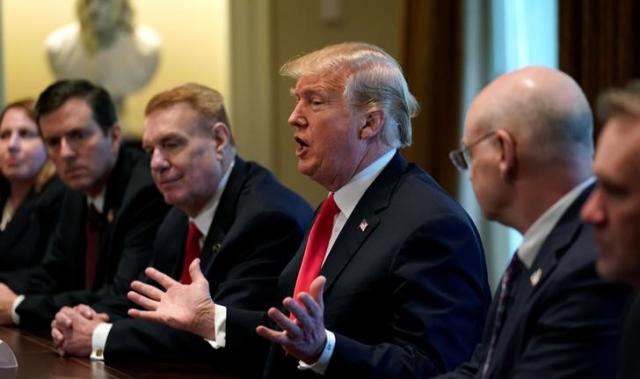By turning to Congress, lobbyists for industries that could lose in a trade war are making a bet that Republican lawmakers would stick to their traditional support for open trade, and potentially use legislative power to derail tariffs.
Congress could try to attach language to the spending bill due late this month restricting the ability of the administration to impose tariffs, while many Republicans were calling for hearings or urging the administration to limit the extent of the tariffs.
Trump and administration trade officials over the weekend said they are determined to go ahead with protective tariffs for steel and aluminum, despite the potential for retaliation by trading partners.
Industry groups opposed to the tariffs got support on Monday from House Speaker Paul Ryan and other senior Republicans. Some Democratic lawmakers from auto-producing states have praised Trump’s move, joining unions long skeptical of open trade deals such as the North American Free Trade Act (NAFTA).
Automakers are reaching out to senators and governors and asking them to make the case against tariffs to the White House, officials said.
“We have and will continue to do all we can to make these facts known to policymakers in the administration, on Capitol Hill, and in statehouses around the country,” said John Bozzella, president and chief executive of Global Automakers, a trade group representing Toyota Motor Corp, Honda Motor Co and other automakers.
Manufacturers of metal-intensive products such as cars and airplanes already are wrestling with rising prices for steel and aluminum, in part because of tight production capacity.
Administration officials in TV interviews over the weekend downplayed the impact on automakers as adding only up to about $200 to the price of a vehicle — a fraction of the average $35,000 sales price. However, Goldman Sachs said in a research report on Sunday that the tariffs could depress General Motors Co and Ford Motor Co’s adjusted operating incomes by $1 billion each.
Groups representing auto dealers weighed in to support the manufacturers. In a flattening auto market, headlines about trade wars and tariffs could cause Americans to put off buying new vehicles, said Cody Lusk, president and chief executive of the American International Automobile Dealers Association.
“Everybody is reaching out to their allies on Capitol Hill just to make sure they are aware of what’s at stake,” Lusk said.
Farm groups representing producers of wheat, corn and soybeans, the top U.S. crop exports valued at nearly $37 billion last year, joined criticism of the proposed tariffs on Monday. Farm groups had been among Trump’s core support group during the 2016 election.
The U.S. agriculture sector is worried that Trump will scrap key trade deals, including NAFTA, that benefit U.S. farmers. Grain buyers in Mexico, a top market for U.S. farm products, have accelerated corn purchases from Brazil amid concern that NAFTA negotiations could disrupt trade.
More about: #Trump
















































